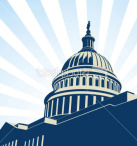Thanks to an amendment to the federal spending bill launched into effect on Saturday, December 13, the U.S. Department of Justice will no longer be able to use its funds to prosecute owners of lawful medical marijuana dispensaries. In states that have already approved the drug as a treatment for chronic illness, patients can rest easy. The federal government will be turning its attention to more pressing criminal matters instead of trying to overrule state regulations with national clout.
Medical marijuana supporters are pleased with the willingness of Congress to honor the reasonable needs of Americans struggling with debilitating conditions. After all, though the Department of Justice claimed that it would maintain a hands-off approach when states began to determine their individual stances on the drug, the department quickly changed its tune. A family of five in Washington State, for instance, has been waiting for their punishment—possibly a decade in prison for each member—for growing almost six dozen cannabis plants on their property. The new amendment could halt the prosecution process in its tracks.
The Department of Justice is known for viewing alternative therapies with a wary eye. California managed to pass the first medical marijuana law in the United States back in 1996, and since then, the DOJ has been challenging the state’s practices, calling them lenient, loose, and disorganized. However, California’s large population almost guarantees that its pot smokers will continue to dominate all relevant legislation. In addition, the District of Columbia is currently facing the threat of another amendment that would prevent federal money from contributing to the legalization of marijuana in their territory. But DC does not seem thwarted by this threat. Its citizens voted about a month ago by a margin of 2-to-1 to adopt medical marijuana use.
While at the federal level legislators might continue to throw obstacles in the paths of medical cannabis advocates, those advocates will most likely push back at their opponents with an insurmountable number of appeals. In the end, the passing of this amendment to the federal spending bill means that Congress is listening to the people who count on them to champion human rights.
December 18, 2014
New Federal Budget means no more Regulation on Medical Marijuana
